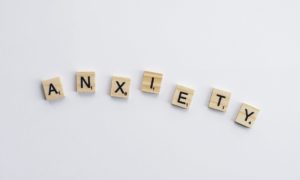5 Signs You May Have Anxiety
Anxiety is the most common type of mental health issue. The word “anxiety” is also used very frequently in everyday language, so it may be tough to determine if you’re just a worrier or if you legitimately have anxiety.
Here are a few of the most common symptoms of anxiety:

Racing Thoughts
You find it difficult to stop thoughts from overpowering your mind. Your thoughts can take over and completely change your mood, even without a trigger. The thoughts come on strong and will not stop. They can interfere with your focus and your sleep.

Overthink and Replay Situations
You may notice that you start replaying old conversations or memories over and over again. Whether it’s something embarrassing that happened in 2nd grade or mistakes you made recently at school/work. Anxiety can involve what I call the lowlight reel. Instead of playing your highlights back to you, your brain plays back your lowest or most stressful moments.

Worrying Excessively
If you find yourself worrying a ton, about things that may or may not ever happen, you may have anxiety. Anxiety usually overpowers your mind and makes you feel stressed about things that are happening, as well as things that aren’t. It can be exhausting and feel like you just can’t shut off your brain.

Avoidance
Usually, people with anxiety do their best to try to avoid the things that are making them anxious. You may not check your mail/email because you’re worried about a bill you’re about to get. Or you’re nervous about what your doctor may say at your next check up, so you don’t make an appointment. You may be concerned about that you may have upset a friend, so you ignore their texts. Avoidance helps in the short term, but increased anxiety over the long run.

Physical issues
Headaches, upset stomach, fidgeting, sweating, shaking, fidgeting, and high blood pressure may all be signs of anxiety. Anxiety usually involves a lot of physical symptoms that can make mental/emotional symptoms worse.

Summary
Any of the above symptoms, or a combination of them, may mean you have anxiety. Almost everyone has experienced anxiety at some time or another throughout their life. As an online anxiety therapist in North Carolina, I can tell you that anxiety can have long lasting impacts on your life.
If you’re experiencing these symptoms frequently and if they’re impairing your life in some way, then it would be a good idea to make an appointment with a therapist. There, you can be evaluated and work towards decreasing those symptoms by understanding what they are, narrowing down where they come from, and learning new ways to cope with them. You don’t have to deal with them alone!
